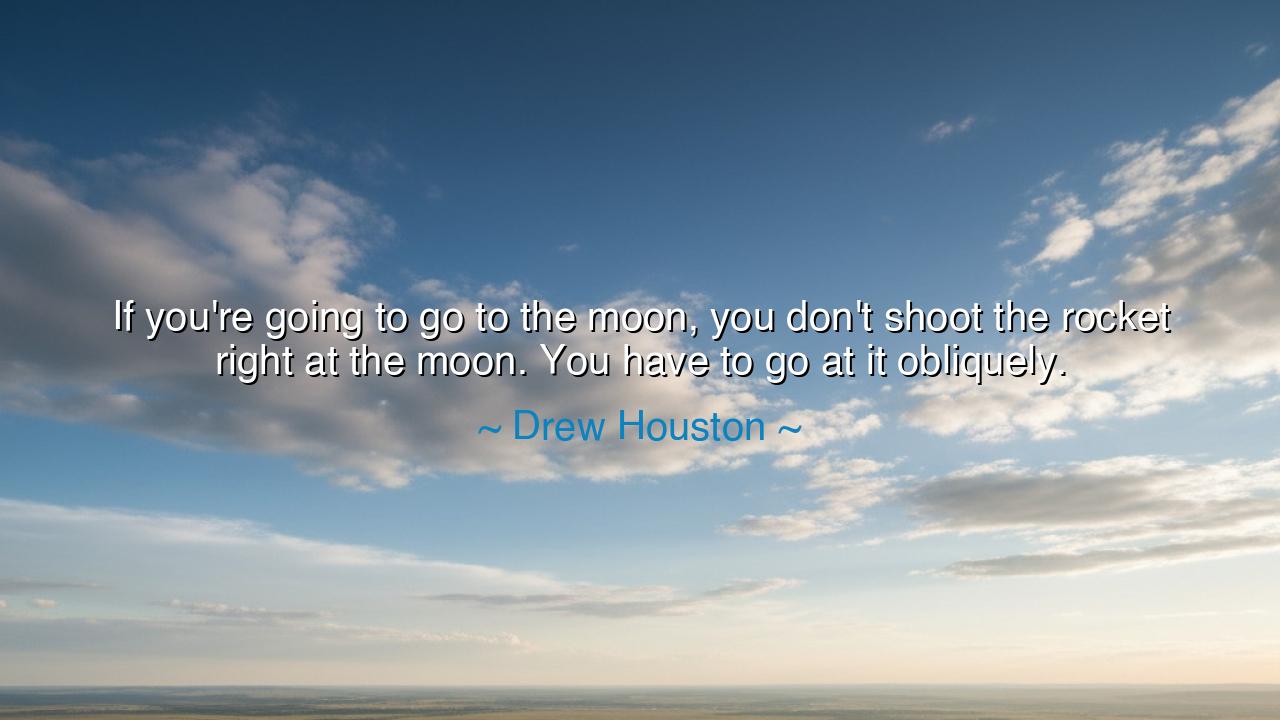
If you're going to go to the moon, you don't shoot the rocket
If you're going to go to the moon, you don't shoot the rocket right at the moon. You have to go at it obliquely.






O Children of the Earth and Stars, gather your hearts, for the words of Drew Houston carry with them a wisdom that reaches beyond the simple task of launching rockets and touches the very essence of vision, strategy, and purpose. He said, "If you're going to go to the moon, you don't shoot the rocket right at the moon. You have to go at it obliquely." In this seemingly simple statement, there is a profound truth: the journey to our grandest goals is rarely a straight path, and sometimes, to reach what we desire, we must approach it from a new and unexpected angle.
In the days of the ancients, when great warriors and thinkers set out to change the world, they often understood that the road to victory was not always direct. Alexander the Great, who sought to conquer the world, did not rush headlong into battle without thought or preparation. His strategy was one of calculation, often leading his forces obliquely, finding indirect routes to outwit his enemies and gain the advantage. He understood that to truly win, one must sometimes step aside from the obvious and find new paths to the goal. Houston’s words echo this ancient truth—true success requires a careful, thoughtful approach, and sometimes, the most direct route is not the one that leads to the most lasting achievement.
To shoot directly for the moon, to aim straight at one’s target, may seem logical at first. It is the path of the bold, of those who believe in their own power to simply move forward. But there is a deeper wisdom in the oblique approach, for it requires patience, adaptability, and the ability to recognize that the most important goals are not achieved with blind force, but with strategy and a willingness to adjust as one progresses. Think of the great explorers like Marco Polo, who did not travel a straight path but ventured through many lands and cultures to reach his destination. His journey was not just a physical one; it was a strategic one, learning, adapting, and sometimes veering from the direct route to find wisdom and success.
Houston's words are not only for those who seek to conquer space, but for all who seek to achieve great things in life. Consider, O Children, the story of Thomas Edison, who, like so many great inventors, did not aim directly at a single solution but experimented with countless approaches before creating the lightbulb. His process was one of trial and error, of changing direction when one approach failed, and of seeking alternatives when the most obvious solutions did not work. Edison’s path to invention was not linear, nor was it a path he could have predicted when he began. His success came not because he rushed toward the finish line, but because he knew that the road to greatness required an oblique approach—a way of looking at the world that saw possibilities where others saw only obstacles.
In the pursuit of any lofty goal, O Seekers, we must remember the wisdom of this oblique path. We are often told to aim high, to go after our dreams with determination, and these things are essential. But we must also remember that the path may not always be clear. Life is full of twists and turns, and sometimes, when we face a barrier, the key to success is not to push harder but to step aside and find a way around it. Think of the great rivers that have carved out the land—no river flows in a straight line. It meanders, adjusts, and shifts, but in doing so, it shapes the world around it, creating pathways that none could have foreseen.
Consider the story of J.K. Rowling, the author of the beloved Harry Potter series. Her path to success was far from straightforward. Rowling faced rejection after rejection from publishers, yet she did not abandon her vision. Instead, she adapted, adjusted, and persevered. Her success did not come by aiming directly at the goal, but by weaving her way through the obstacles of rejection, poverty, and doubt. Her story is one of indirect persistence, of finding ways around the closed doors until the right one opened.
So, O Children, the lesson is clear: when faced with great challenges, do not be discouraged by the straightforward path that seems impossible to follow. Instead, remember that the journey to your greatest goals may require you to approach them obliquely. Strategy, creativity, and the willingness to adapt are the keys to success. Just as a rocket cannot shoot directly to the moon without careful planning and adjustment, so too must you navigate the complexities of your life and work. Adapt, change, and find alternate routes—for these are the paths that lead to true greatness.
Therefore, O Seekers, take this wisdom to heart: when your ambitions seem distant or unattainable, don’t despair. Adjust your approach, and take the oblique route, knowing that true strength lies not in blind determination, but in the wisdom to know when to change course. Let the journey be as much a part of your growth as the destination itself, for it is the path that shapes you into the person capable of achieving the greatness you seek.






AAdministratorAdministrator
Welcome, honored guests. Please leave a comment, we will respond soon